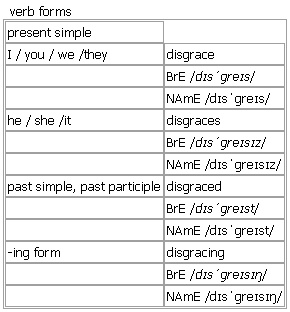|
Từ điển Oxford Advanced Learner 8th
 disgrace
disgrace
dis·grace [disgrace disgraces disgraced disgracing] noun, verb BrE [dɪsˈɡreɪs] NAmE [dɪsˈɡreɪs]
noun
1. uncountable the loss of other people's respect and approval because of the bad way sb has behaved
Syn: ↑shame
•Her behaviour has brought disgrace on her family.
•The swimmer was sent home from the Olympics in disgrace.
•There is no disgrace in being poor.
•Sam was in disgrace with his parents.
2. singular a ~ (to sb/sth) a person or thing that is so bad that people connected with them or it feel or should feel ashamed
•Your homework is an absolute disgrace.
•That sort of behaviour is a disgrace to the legal profession.
•The state of our roads is a national disgrace.
•It's a disgrace that (= it is very wrong that) they are paid so little.
Word Origin:
mid 16th cent. (as a verb): via French from Italian disgrazia (noun), disgraziare (verb), from dis- (expressing reversal) + Latin gratia ‘grace’.
Thesaurus:
disgrace noun
1. U
•Her behaviour brought disgrace on her family.
shame • |formal discredit • • disrepute • |BrE, formal dishonour • |AmE, formal dishonor •
Opp: honour/honor
in disgrace/disrepute
bring disgrace/shame/discredit/dishonour on sb/sth
There is no disgrace/shame/dishonour in sth
Which word? All these words are used to talk about a public loss of respect. Disgrace is also used to talk about the loss of respect of people you are close to.
2. sing.
•The state of our roads is a national disgrace.
informal crime • |formal evil • • abomination • • iniquity •
It's a disgrace/crime.
It's a disgrace/crime to do sth.
Example Bank:
•His crime had brought disgrace upon his whole family.
•She was sent home from the Olympics in disgrace.
•The filthy streets are a disgrace to the town.
•The state of our hospitals is a national disgrace.
•Their father fell into disgrace and lost his business.
•There's no disgrace in being poor.
•This room is an absolute disgrace!
•He's in disgrace for having left his room in a mess.
•It's a disgrace that they are paid so little.
verb
1. to behave badly in a way that makes you or other people feel ashamed
•~ yourself I disgraced myself by drinking far too much.
•~ sb/sth He had disgraced the family name.
2. be disgracedto lose the respect of people, usually so that you lose a position of power
•He was publicly disgraced and sent into exile.
•a disgraced politician/leader
Verb forms: 
Word Origin:
mid 16th cent. (as a verb): via French from Italian disgrazia (noun), disgraziare (verb), from dis- (expressing reversal) + Latin gratia ‘grace’.
|
|
|
▼ Từ liên quan / Related words
Related search result for "disgrace"
|
|
